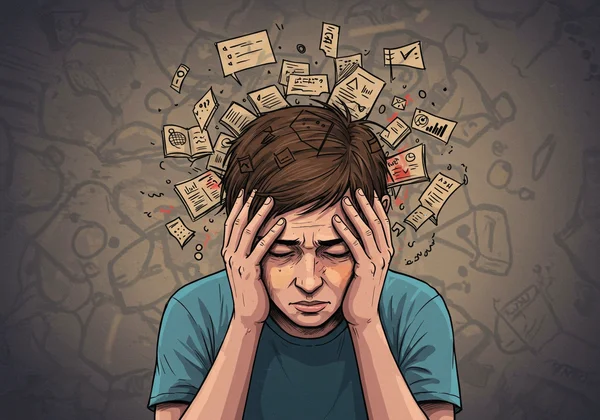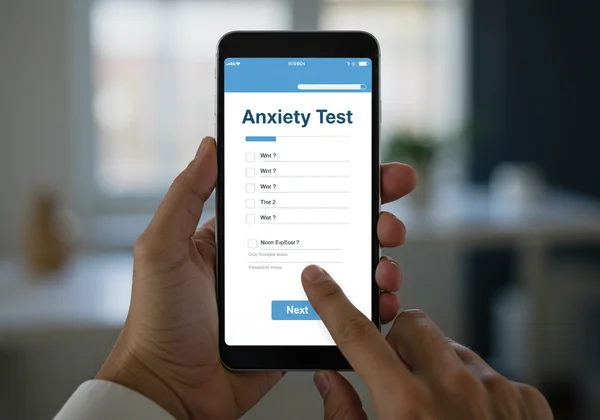चिंता बनाम तनाव: अंतर जानें और चिंता परीक्षण लें
July 27, 2025 | By Isla Caldwell
क्या आप अभिभूत, लगातार चिंतित या बेचैन महसूस कर रहे हैं? आज की भाग-दौड़ भरी दुनिया में, "तनाव" और "चिंता" शब्दों का परस्पर उपयोग करना आसान है। हालांकि उनमें समान भावनात्मक और शारीरिक लक्षण होते हैं, लेकिन सही सहायता प्राप्त करने के लिए अंतर को समझना पहला महत्वपूर्ण कदम है। यह मार्गदर्शिका आपको इन दोनों के बीच के अंतर को समझने में मदद करेगी। इससे आप अपनी भावनाओं को बेहतर ढंग से समझ पाएंगे और अगले कदम तय कर पाएंगे। क्या मुझे चिंता है या मैं सिर्फ तनाव में हूँ? यह एक ऐसा सवाल है जो हम में से बहुत से लोग पूछते हैं, और स्पष्टता प्राप्त करना आपके मानसिक कल्याण के लिए आवश्यक है। यदि आप उत्तर ढूंढ रहे हैं, तो अपनी भावनाओं में गोपनीय अंतर्दृष्टि प्राप्त करें।
तनाव को समझना: आपके शरीर की प्राकृतिक प्रतिक्रिया
तनाव किसी मांग या खतरे के प्रति आपके शरीर की प्रतिक्रिया है। इसे एक बाहरी ट्रिगर, जैसे कि काम की आसन्न समय-सीमा, एक कठिन बातचीत, या यातायात जाम के प्रति प्रतिक्रिया के रूप में सोचें। यह प्रतिक्रिया, जिसे अक्सर "संघर्ष या पलायन" (fight-or-flight) प्रतिक्रिया कहा जाता है, एक सहज बचाव वृत्ति है। यह एड्रेनालाईन और कोर्टिसोल जैसे हार्मोन जारी करता है, जो आपकी हृदय गति बढ़ाकर, आपकी इंद्रियों को तेज करके और आपकी मांसपेशियों को कसकर आपको चुनौती का सामना करने के लिए तैयार करते हैं। कम समय के लिए, तनाव सकारात्मक हो सकता है, जो आपको दबाव में बेहतर प्रदर्शन करने के लिए प्रेरित करता है।
तनाव के सामान्य लक्षण: क्या देखना है
जब आप किसी विशेष तनाव कारक से निपट रहे होते हैं, तो आपका शरीर स्पष्ट संकेत भेजता है। ये शारीरिक, भावनात्मक और व्यवहारिक रूप से प्रकट हो सकते हैं। तनाव के सामान्य लक्षणों में सिरदर्द, मांसपेशियों में तनाव, थकान, चिड़चिड़ापन और ध्यान केंद्रित करने में कठिनाई शामिल है। आप खुद को अभिभूत या आसानी से चिड़चिड़ा महसूस कर सकते हैं। ये भावनाएं आमतौर पर तनावपूर्ण स्थिति से सीधे जुड़ी होती हैं और ट्रिगर के चले जाने के बाद कम हो जाती हैं।
जब तनाव पुराना हो जाता है: आपके कल्याण पर प्रभाव
चुनौती तब शुरू होती है जब तनाव कारक दूर नहीं होता है, या नए लगातार सामने आते रहते हैं। इससे पुराना तनाव होता है, जहाँ आपका शरीर लगातार उच्च चेतावनी की स्थिति में रहता है। समय के साथ, यह आपके स्वास्थ्य पर महत्वपूर्ण प्रभाव डाल सकता है, जिससे उच्च रक्तचाप, कमजोर प्रतिरक्षा प्रणाली और बर्नआउट जैसी समस्याएं हो सकती हैं। प्रबंधनीय, अल्पकालिक तनाव और थकाऊ, पुराने तनाव के बीच की रेखा को पहचानना आपके कल्याण की रक्षा के लिए महत्वपूर्ण है।

चिंता को समझना: साधारण चिंता से कहीं अधिक
दूसरी ओर, चिंता तनाव के प्रति आपके शरीर की प्रतिक्रिया है, लेकिन यह लगातार, अत्यधिक चिंता की विशेषता है जो किसी विशेष तनाव कारक की अनुपस्थिति में भी दूर नहीं होती है। जबकि तनाव एक वर्तमान खतरे की प्रतिक्रिया है, चिंता अक्सर भविष्य के खतरे पर केंद्रित होती है - "क्या होगा"। यह डर या घबराहट की भावना है जो बनी रहती है, जिससे आराम करना और वर्तमान क्षण का आनंद लेना मुश्किल हो जाता है। यदि ये भावनाएं प्रतिध्वनित होती हैं, तो एक ऑनलाइन चिंता परीक्षण आत्म-चिंतन के लिए एक सहायक उपकरण हो सकता है।
चिंता के मुख्य लक्षण: भावनात्मक, शारीरिक और व्यवहारिक संकेत
चिंता के लक्षण अक्सर तनाव के साथ ओवरलैप होते हैं लेकिन आमतौर पर अधिक तीव्र और लंबे समय तक चलने वाले होते हैं। भावनात्मक रूप से, आपको घबराहट, घबराहट या भयानक परिणाम का अहसास का लगातार अनुभव हो सकता है। शारीरिक रूप से, यह दिल की धड़कन तेज होना, सांस की तकलीफ, पसीना आना, कांपना और पाचन संबंधी समस्याएं हो सकती हैं। व्यवहारिक रूप से, चिंता आपको उन स्थितियों से बचने का कारण बन सकती है जो आपकी चिंता को ट्रिगर करती हैं, जिससे सामाजिक अलगाव या टालमटोल हो सकता है।
चिंता सामान्य चिंता से कैसे भिन्न है
हर कोई कभी-कभी चिंता करता है। नौकरी के साक्षात्कार या पहली डेट के बारे में चिंता करना सामान्य है। चिंता के साथ अंतर डिग्री और अवधि का है। चिंता से जुड़ी चिंता अक्सर वास्तविक स्थिति के अनुपात से ज़्यादा होती है, अनियंत्रित महसूस होती है और आपके दैनिक जीवन में बाधा डालती है। यह उड़ान के बारे में घबराने और इसे होने से पहले हफ्तों तक सो न पाने के बीच का अंतर है।
चिंता बनाम तनाव: पहचानने योग्य मुख्य अंतर
तो, आप कैसे बता सकते हैं कि आप तनावग्रस्त हैं या चिंतित? मुख्य अंतर इसके ट्रिगर (कारण) में निहित है। तनाव एक ज्ञात, बाहरी कारण की प्रतिक्रिया है। चिंता आंतरिक होती है और तनावपूर्ण घटना के समाप्त होने के लंबे समय बाद भी बनी रह सकती है, या बिना किसी स्पष्ट ट्रिगर के भी उत्पन्न हो सकती है। इन बारीकियों को समझना आपकी भावनाओं को प्रभावी ढंग से प्रबंधित करने की दिशा में पहला कदम है।
अवधि, तीव्रता और ट्रिगर: अंतरों को खोलना
आइए मुख्य अंतरों को तोड़ें:
- ट्रिगर: तनाव आमतौर पर किसी बाहरी कारक (एक परियोजना, एक लड़ाई) के कारण होता है। चिंता एक आंतरिक प्रतिक्रिया है जो बिना किसी स्पष्ट कारण के हो सकती है।
- अवधि: तनाव आम तौर पर अल्पकालिक होता है और तनाव कारक हटा दिए जाने के बाद समाप्त हो जाता है। चिंता लगातार बनी रहती है और हफ्तों, महीनों या उससे अधिक समय तक चल सकती है।
- फोकस: तनाव वर्तमान स्थिति की प्रतिक्रिया है। चिंता अक्सर भविष्य-उन्मुख होती है कि क्या हो सकता है।
- प्रभाव: जबकि दोनों दुर्बल करने वाले हो सकते हैं, चिंता एक विकार में विकसित हो सकती है जो स्कूल, काम और रिश्तों में आपकी कार्य करने की क्षमता को महत्वपूर्ण रूप से बाधित करती है।
"क्या मुझे तनाव है या चिंता?": एक त्वरित स्व-जांच मार्गदर्शिका
अधिक स्पष्टता प्राप्त करने के लिए स्वयं से ये प्रश्न पूछें:
- क्या मेरी बेचैनी किसी विशिष्ट, वर्तमान समस्या या घटना से जुड़ी है? (अधिक संभावना तनाव)
- क्या मैं तब भी चिंतित और भयभीत महसूस करता हूँ जब चीजें ठीक चल रही हों? (अधिक संभावना चिंता)
- क्या किसी कठिन परिस्थिति के समाप्त होने के बाद मेरे तनाव की भावनाएं दूर हो गईं? (अधिक संभावना तनाव)
- क्या मैं भविष्य में होने वाली चीजों के बारे में बहुत समय चिंता करता हूँ? (अधिक संभावना चिंता)
- क्या मैं किसी स्थिति से इसलिए बचता हूँ क्योंकि मुझे डर है कि मुझे कैसा महसूस होगा? (अधिक संभावना चिंता)
यह त्वरित स्व-मूल्यांकन एक शुरुआती बिंदु है। गहरी समझ के लिए, एक संरचित मूल्यांकन अविश्वसनीय रूप से सहायक हो सकता है।
आगे क्या करें: स्पष्टता और समर्थन के लिए आपका मार्ग
लक्षणों को पहचानना एक शक्तिशाली पहला कदम है। अगला कदम कार्रवाई करना है। चाहे आप पुराने तनाव, चिंता, या दोनों के मिश्रण से निपट रहे हों, नियंत्रण हासिल करने और बेहतर महसूस करने में आपकी मदद करने के लिए उपकरण और रणनीतियाँ उपलब्ध हैं। आपके मानसिक कल्याण की यात्रा एक एकल, प्रबंधनीय कार्रवाई से शुरू होती है।
चिंता परीक्षण लेना: एक गोपनीय पहला कदम
यदि आप अनिश्चित हैं कि आप क्या अनुभव कर रहे हैं, तो एक गोपनीय चिंता परीक्षण वस्तुनिष्ठ अंतर्दृष्टि प्रदान कर सकता है। हमारा प्लेटफ़ॉर्म GAD-7 स्केल पर आधारित एक निःशुल्क, गुमनाम चिंता परीक्षण प्रदान करता है, जो चिकित्सकीय रूप से मान्य है। तीन मिनट से भी कम समय में, आप एक स्कोर प्राप्त कर सकते हैं जो आपके लक्षणों को मापने में आपकी सहायता करता है। गहरी समझ की तलाश करने वालों के लिए, हमारा अनूठा AI-संचालित विश्लेषण आपकी गोपनीयता की सुरक्षा करते हुए, कार्रवाई योग्य सलाह के साथ एक व्यक्तिगत रिपोर्ट प्रदान करता है। कोई पंजीकरण आवश्यक नहीं है - केवल स्पष्ट, तत्काल परिणाम जो आपको अपना स्कोर समझने में मदद करते हैं।

पेशेवर मदद कब लेनी चाहिए
ऑनलाइन स्क्रीनिंग टूल आत्म-जागरूकता के लिए एक उत्कृष्ट प्रारंभिक बिंदु है, लेकिन यह पेशेवर चिकित्सा सलाह का विकल्प नहीं है। यदि आपके लक्षण लगातार, गंभीर हैं, और आपके दैनिक जीवन में बाधा डाल रहे हैं, तो स्वास्थ्य पेशेवर से परामर्श करना महत्वपूर्ण है। एक डॉक्टर या चिकित्सक एक औपचारिक निदान प्रदान कर सकता है और आपके साथ एक अनुकूलित उपचार योजना बनाने के लिए काम कर सकता है, जिसमें थेरेपी, दवा या अन्य सहायता रणनीतियां शामिल हो सकती हैं।
तनाव और चिंता दोनों को प्रबंधित करने के लिए व्यावहारिक रणनीतियाँ
चाहे आप तनाव, चिंता, या दोनों से निपट रहे हों, कुछ मुकाबला करने की रणनीतियाँ तत्काल राहत और दीर्घकालिक लाभ प्रदान कर सकती हैं। गहरी साँस लेने के व्यायाम, 5-4-3-2-1 ग्राउंडिंग विधि, और नियमित शारीरिक गतिविधि जैसी तकनीकें आपके तंत्रिका तंत्र को शांत कर सकती हैं। नींद को प्राथमिकता देना, संतुलित आहार बनाए रखना और सचेतनता का अभ्यास करना भी समय के साथ आपकी सहनशक्ति का निर्माण कर सकता है।
आपकी आगे की यात्रा: स्पष्टता और कल्याण को अपनाना
तनाव और चिंता के बीच अंतर करना केवल शब्दों का खेल नहीं है; यह प्रभावी ढंग से नेविगेट करने के लिए आपकी आंतरिक दुनिया को समझना है। तनाव एक चुनौती की प्रतिक्रिया है, जबकि चिंता चिंता की एक स्थायी स्थिति है। लक्षणों को पहचानकर, आप स्वयं को सार्थक कार्रवाई करने के लिए सशक्त बनाते हैं।
आपके बेहतर मानसिक स्वास्थ्य की यात्रा अनूठी है, और सबसे महत्वपूर्ण कदम वह है जो आप आज उठाते हैं। यदि यह लेख आपके लिए प्रासंगिक है, तो व्यक्तिगत स्पष्टता प्राप्त करने के लिए हमारे निःशुल्क चिंता परीक्षण को लेने पर विचार करें। यह आपकी भलाई को समझना और प्रबंधित करना शुरू करने का एक सरल, निजी और शक्तिशाली तरीका है।
अस्वीकरण: यह लेख केवल सूचनात्मक उद्देश्यों के लिए है और चिकित्सीय सलाह नहीं माना जाना चाहिए। हमारा परीक्षण एक स्क्रीनिंग टूल है, न कि नैदानिक उपकरण। कृपया किसी भी स्वास्थ्य संबंधी चिंताओं के लिए एक योग्य स्वास्थ्य पेशेवर से परामर्श करें।
चिंता और तनाव के बारे में अक्सर पूछे जाने वाले प्रश्न
क्या मुझे चिंता है या मैं सिर्फ तनाव में हूँ?
मुख्य अंतर अक्सर इसके ट्रिगर (कारण) और अवधि में होता है। तनाव आमतौर पर किसी विशिष्ट बाहरी दबाव की प्रतिक्रिया होती है और दबाव के हट जाने पर कम हो जाती है। चिंता अधिक आंतरिक होती है, जो लगातार चिंता की विशेषता है जो बिना किसी स्पष्ट कारण के भी बनी रहती है। यदि आपकी बेचैनी लगातार बनी रहती है और आपके दैनिक जीवन में बाधा डालती है, तो यह सिर्फ तनाव से अधिक हो सकती है।
चिंता के 5 संकेत क्या हैं?
हालांकि लक्षण भिन्न होते हैं, पांच सामान्य संकेतों में शामिल हैं: 1) विभिन्न चीजों के बारे में अत्यधिक और अनियंत्रित चिंता। 2) शारीरिक लक्षण जैसे दिल की धड़कन तेज होना, सांस की तकलीफ, या पेट की समस्याएं। 3) बेचैन, घबराहट, या आसानी से थक जाना। 4) ध्यान केंद्रित करने में कठिनाई या आपका दिमाग खाली हो जाना। 5) बढ़ी हुई चिड़चिड़ापन और सोने में कठिनाई।
मैं खुद को चिंता के लिए कैसे परीक्षण कर सकता हूँ?
शुरुआत करने का एक विश्वसनीय तरीका एक मान्य स्क्रीनिंग टूल का उपयोग करना है। आप GAD-7 जैसे नैदानिक स्केल पर आधारित एक निःशुल्क, गोपनीय ऑनलाइन परीक्षण के साथ अपने चिंता स्तर की जांच कर सकते हैं। यह एक त्वरित स्कोर और आपके लक्षण गंभीरता में अंतर्दृष्टि प्रदान करता है, जो आत्म-चिंतन के लिए या स्वास्थ्य पेशेवर के साथ बातचीत के लिए एक मूल्यवान पहला कदम के रूप में कार्य करता है।